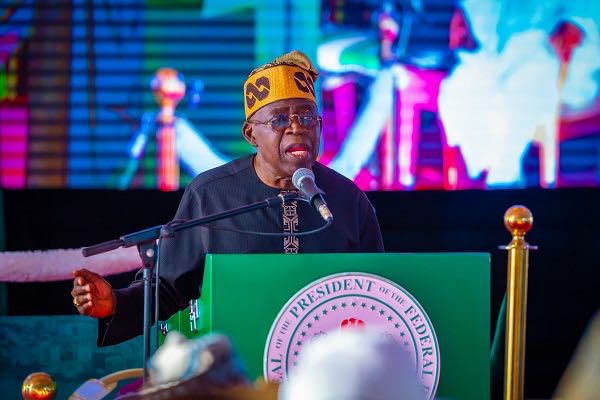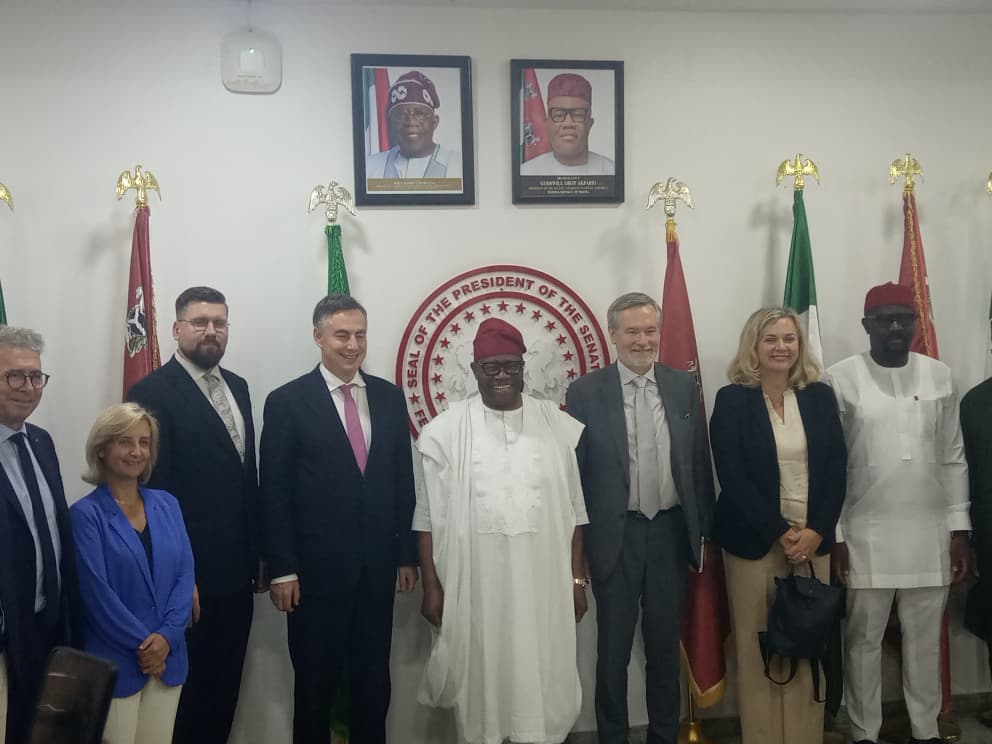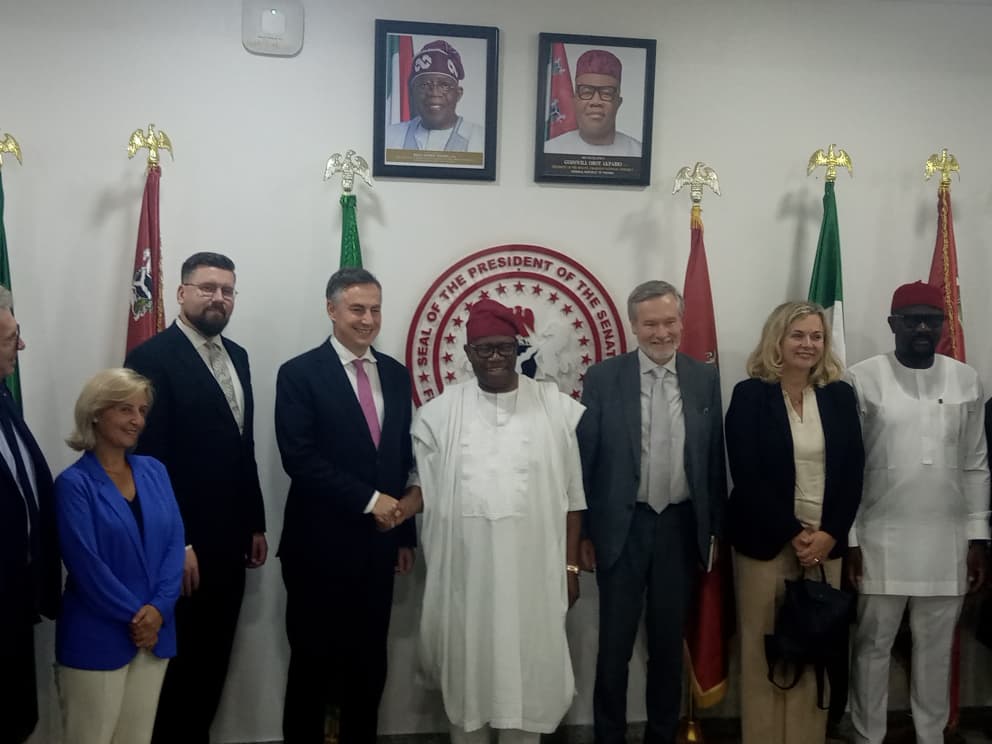Economy
FG Plans N2tn Economic Revival Scheme, Inaugurates Council

The Federal Government has unveiled the outcomes of its review of the accelerated stabilization and advancement plan, which aims to inject N2tn into the economy over the next six months.
President Bola Tinubu, during the inauguration of the 31-member Presidential Economic Coordination Council (PECC) at Aso Rock Villa, Abuja, on Thursday, expressed his administration’s commitment to increasing crude oil production to two million barrels per day and boosting electricity generation for Nigerians in the coming months. He criticized the current levels of power generation and crude oil production as “shameful.”
The PECC, established on March 27, 2024, includes Tinubu, Vice President Kashim Shettima, Senate President Godswill Akpabio, the Chairman of the Nigerian Governors Forum, Governor Abdulrahman Abdulrazaq of Kwara State, and the Governor of the Central Bank of Nigeria, Yemi Cardoso. It also features 13 representatives from the organized private sector, including prominent figures like Aliko Dangote, Tony Elumelu, and Abdulsamad Rabiu, who will serve on the council for one year.
Addressing the private sector representatives, Tinubu said, “As a nation, it is so shameful that we have about 4.5 gigawatts. We must increase our oil production to 2 million barrels per day within the next few months. Remove all barriers hindering investments into the sector to enhance competitiveness.”
Despite being Africa’s largest oil producer, Nigeria has struggled to meet its OPEC production quotas due to pipeline vandalism, oil theft, and operational inefficiencies. In May 2024, crude oil production averaged only 1.25 million barrels per day, well below the OPEC+ quota and the government’s target of 1.7 million bpd for budgetary purposes. Similarly, the nation’s power generation capacity of 4.5 gigawatts is inadequate for the industrial needs of over 200 million citizens, leading to frequent power outages and stifling economic productivity.
Tinubu emphasized the administration’s determination to partner with the private sector to overcome these hurdles. He stressed the importance of food security and recalled his previous policies, including declaring a state of emergency on food security and improving mechanization to boost staple crop production by smallholder farmers. Tinubu also highlighted the Sokoto-Badagry road project, announced at the last Federal Executive Council meeting, as part of his administration’s infrastructural development efforts.
Minister of Finance and Coordinating Minister of the Economy, Mr. Wale Edun, provided a breakdown of the emergency funding: N350bn for Health and Social Welfare, N500bn for Agriculture and Food Security, N500bn for the Energy and Power sector, and general business support of about N650bn.
Edun explained, “The President has just inaugurated the Presidential Economic Coordination Council, a body that includes the President’s Economic Management Team, the Legislature, and the private sector. They were presented with the outcomes of Mr. President’s review of the accelerated stabilization and advancement plan for the next six months.”
Aliko Dangote, Chairman of Dangote Group, assured that the private sector would “invest heavily” in job-creating initiatives, expressing confidence that Nigeria’s economy could be turned around within a few months. He emphasized the need for effective implementation of policies to drive economic growth.
The PECC also includes the Ministers of Agriculture and Food Security; Aviation and Aerospace Development; Budget and Economic Planning; Communications, Innovation and Digital Economy; Industry, Trade and Investment; Labour and Employment; Marine and Blue Economy; Power; Petroleum Resources (State); Gas (State); Transportation; and Works.
Other private sector members include Ms. Amina Maina, Mr. Begun Ajayi-Kadir, Mrs. Funke Okpeke, Dr. Doyin Salami, Mr. Patrick Okigbo, Mr. Kola Adesina, Mr. Segun Agbaje, Mr. Chidi Ajaere, Mr. Abdulkadir Aliu, and Mr. Rasheed Sarumi.
The inauguration of the PECC is part of Tinubu’s efforts to re-engineer the nation’s economic governance framework. The council’s creation follows the discontinuation of petrol subsidies and the unification of foreign exchange rates to curb currency arbitrage, moves that have sparked significant instability in the value of the naira and increased food prices.
Ajuri Ngelale, Tinubu’s Special Adviser on Media and Publicity, noted that the establishment of the PECC is a strategic move to ensure robust and coordinated economic planning and implementation to tackle the nation’s economic challenges head-on.
Economy
JUST IN: FG Halts Planned 15% Import Duty on Petrol, Diesel

By: Fabian Apechihin
The Federal Government has suspended the planned implementation of a 15 percent import duty on petrol and diesel.
This was disclosed on Thursday by George Ene-Ita, Director of Public Affairs at the Nigerian Midstream and Downstream Petroleum Regulatory Authority (NMDPRA), who urged Nigerians to avoid panic buying.
President Bola Tinubu had earlier, on October 29, approved the imposition of the tariff following a proposal by the Executive Chairman of the Federal Inland Revenue Service (FIRS), Zacch Adedeji. The approval, conveyed in a letter signed by the President’s Private Secretary, Damilotun Aderemi, was intended to take effect from November 21, 2025.
The proposed policy sought to impose a 15 percent duty on the cost, insurance, and freight (CIF) value of imported petrol and diesel. It was aimed at supporting domestic refineries — such as the Dangote Refinery and modular plants — by making imported fuel less competitive. However, experts cautioned that the move could lead to an increase of up to ₦150 per litre in pump prices and further fuel inflation and transportation costs.
In its latest update, the NMDPRA confirmed that the import duty is no longer under consideration.
“It should also be noted that the implementation of the 15% ad-valorem import duty on imported Premium Motor Spirit (PMS) and Automotive Gas Oil (Diesel) is no longer in view,” the Authority stated.
The agency further assured the public of adequate fuel availability across the country, noting that national stock levels remain within the required sufficiency threshold.
“There is a robust domestic supply of petroleum products — including PMS, AGO, and LPG — from both local refineries and imports, ensuring timely replenishment of depots and retail stations,” the statement added.
NMDPRA cautioned marketers against hoarding, panic buying, or arbitrary price increases, emphasizing that it will continue to monitor the market to prevent any disruption in supply.
“While appreciating the efforts of stakeholders in maintaining smooth and uninterrupted supply, the public is assured of NMDPRA’s commitment to safeguarding national energy security,” the statement concluded.
Economy
FGN, Sign $400m Deal To Boost Local Steel Production

From Hassan Taiye
The Federal Government of Nigeria, FGN, through the Ministry of Steel Development, has signed a Joint Strategic Cooperation Declaration with Stellar Steel Company Limited.
Stellar Steel Company Limited is a steel-manufacturing enterprise established to operate in Nigeria, with major investment backing from Chinese parent groups: Galaxy Group and RSIN Group based in Fuzhou, Fujian Province, China.
The company has committed approximately US$450 million for a steel plant project in Ogun State, Nigeria, scheduled to begin operations by mid-2026.
This landmark partnership is aimed at revitalising Nigeria’s steel industry and reducing the nation’s dependence on imported steel products, according to a statement signed by the the Principal Information Officer, PIO, Ijomah Opia, for the director, Information and Public Relations in the ministry.
The agreement, signed in Abuja, on Tuesday 28th October, 2025 will see Stellar Steel invest $400 million in the construction of a modern Steel Plant in Ewekoro, Ogun State. The project will be developed in three phases, with the first phase expected to begin production by 2026.
The Minister of Steel Development Prince Shuaibu Abubakar Audu signed the agreement when he hosted Mr Li, President of Inner Galaxy Group and other members of the Stellar Steel Company Limited in the Ministry’s Headquarters in Abuja.
According to Prince Audu, the collaboration aligns with the federal government’s goal of achieving 10 million tonnes of crude steel production per annum by 2030, a major step toward industrial self-reliance and economic diversification.
The minister further stated that the Federal Ministry of Steel Development would facilitate policy and infrastructure support, including inclusion of Stellar Steel’s logistics projects in the National Infrastructure Plan and access to available fiscal incentives.
Highlights of the cooperation includes the followings:
1.Development of a localised iron ore supply chain to reduce import dependence and save over $1 billion in foreign exchange annually.
- Creation of more than 2,000 direct and 20,000 indirect jobs across the steel value chain.
- Promotion of green steel production using clean and energy-efficient technologies.
- Strengthening of Nigeria’s position as a regional steel manufacturing hub in West Africa.
Audi also said that in return, Stellar Steel would prioritise local recruitment and training, partnering with Nigerian universities to build technical and managerial expertise in steel production.
Prince Shuaibu emphasised that this strategic cooperation marks a new era for Nigeria’s steel industry and demonstrates the government’s commitment to sustainable industrial growth and economic transformation.
In his remarks the leader of the delegation, Mr Li assured the minister that Stellar Steel would respect all agreements reached and would ensure the completion of the project in record time and assured that all safety standards will be observed.
Mr Li was accompanied during the visit by Mr You Xiastian, Vice Chairman of RSIN Group, Mr Jackie Den, Vice President of Inner Galaxy Group and Mr Yin, Director of RSIN Group.
He recalled that the Minister of Steel Development, Prince Audu, performed the groundbreaking ceremony of the Steel Plant in Ogun State sometime in April, 2025.
Speaking at the signing, representatives of both parties emphasised that the partnership would strengthen Nigeria’s industrial base, create jobs, and foster technology transfer in the sector.
Economy
EU Delegation Strengthens Ties with Nigerian Senate

From Hassan Taiye
A high-level delegation from the European Union (EU) Parliament’s Foreign Affairs Committee, led by Mr. David McAllister, paid a courtesy visit to the Nigerian Senate today October 28, 2025.

“We are here to deepen our understanding of the situation in West Africa and strengthen our partnership with Nigeria,” McAllister said.
Senate President Godswill Akpabio welcomed the delegation, emphasizing Nigeria’s strategic partnership with the EU. “Nigeria is committed to strengthening ties with the EU, highlighting areas of mutual interest, including security, trade, and governance,” Akpabio said.
The delegation, comprising Ambassador Greta Mylott, EU Ambassador to Nigeria and ECOWAS, Miss Zelaya Zorko, Miss Mata Tamido, Sebastian Tankman, General Christophe Gomart, and Sebastian Buharo, is undertaking a comprehensive tour of West Africa, with stops in Nigeria and Ghana.
During the visit, Akpabio shed light on the challenges facing female representation in Nigeria’s parliament. “Women often vote for male candidates, making it difficult for female candidates to win elections,” he noted.
“The Senate is exploring innovative solutions, including constitutional amendments, to boost female participation in the legislative process, with support from organizations like the Black Women’s Forum.”
The EU delegation’s visit aims to foster greater understanding and cooperation between the EU and Nigeria, addressing shared concerns, such as terrorism, climate change, and economic development.
“The EU is committed to supporting Nigeria’s development efforts,” McAllister assured the Senate, emphasizing the bloc’s interest in seeing a stable, prosperous, and democratic Nigeria.
Their visit also includes participation in the forthcoming International Islamic Conference on Security and Governance in West Africa and the Sahel, scheduled for November 4-6, 2025 at ECOWAS Commission.
Akpabio expressed optimism about the potential for enhanced cooperation, highlighting Nigeria’s readiness to work with the EU to address common challenges.
-

 Uncategorized5 years ago
Uncategorized5 years agoFG, states urged to harness flooding for ranching, others with technology – Agbaje
-

 Headlines10 years ago
Headlines10 years agoBreaking: EFCC seals Borno House of Assembly, as Hon members take to their heels
-

 News11 years ago
News11 years agoNigeria Security Operatives Stage Manhunt For Homosexual Perpetrator
-

 News9 years ago
News9 years agoHow 21-year-old Girl fled community over accusation of lesbianism
-

 News10 years ago
News10 years agoYobe Gov Moves Against Deputy
-

 Opinion7 years ago
Opinion7 years ago7 signs she has friend zoned you
-
Technology4 years ago
Online job placement company headhunts women
-

 Headlines10 years ago
Headlines10 years agoBorno Dep Gov Abducts Another Church Leader





